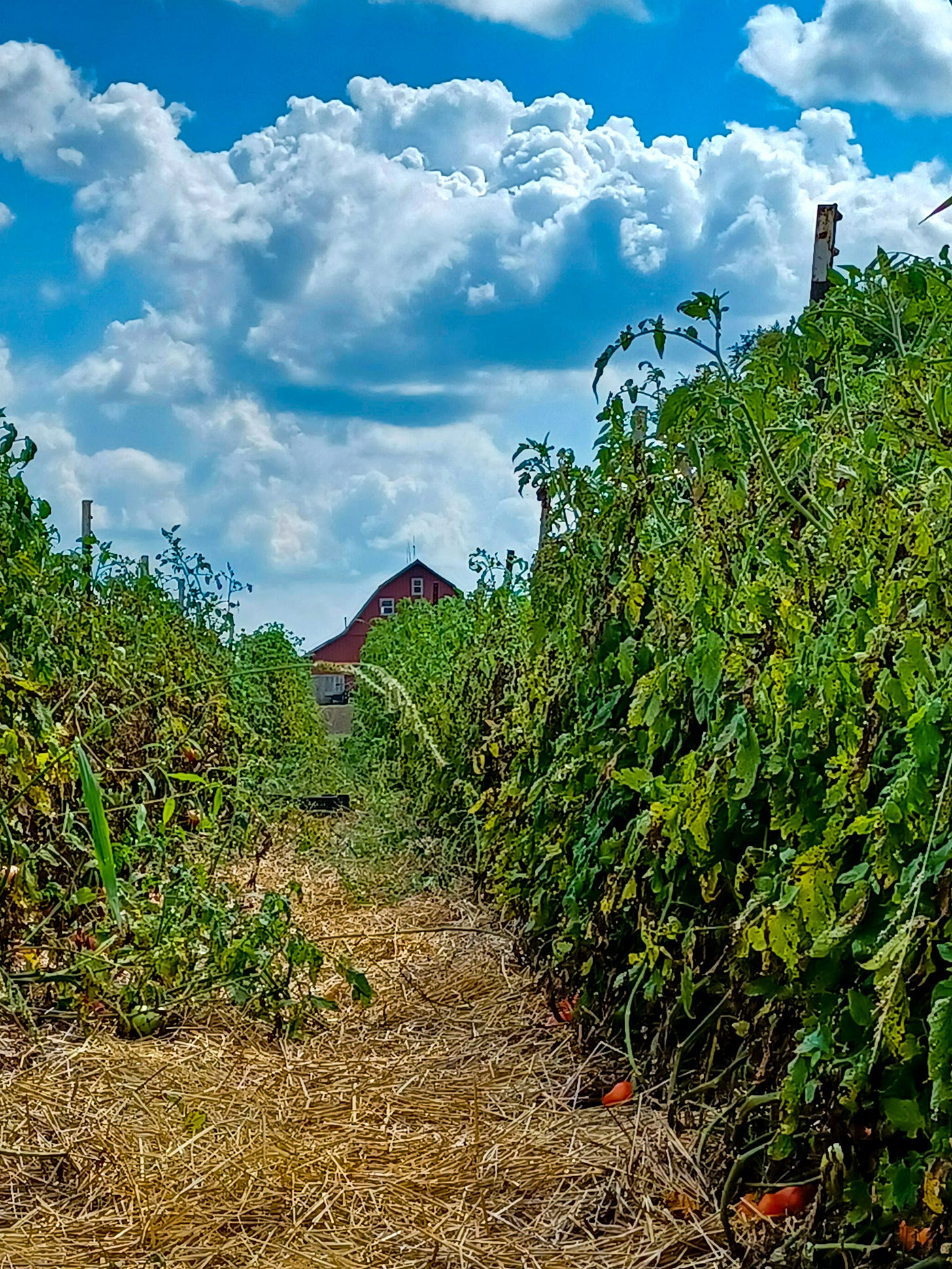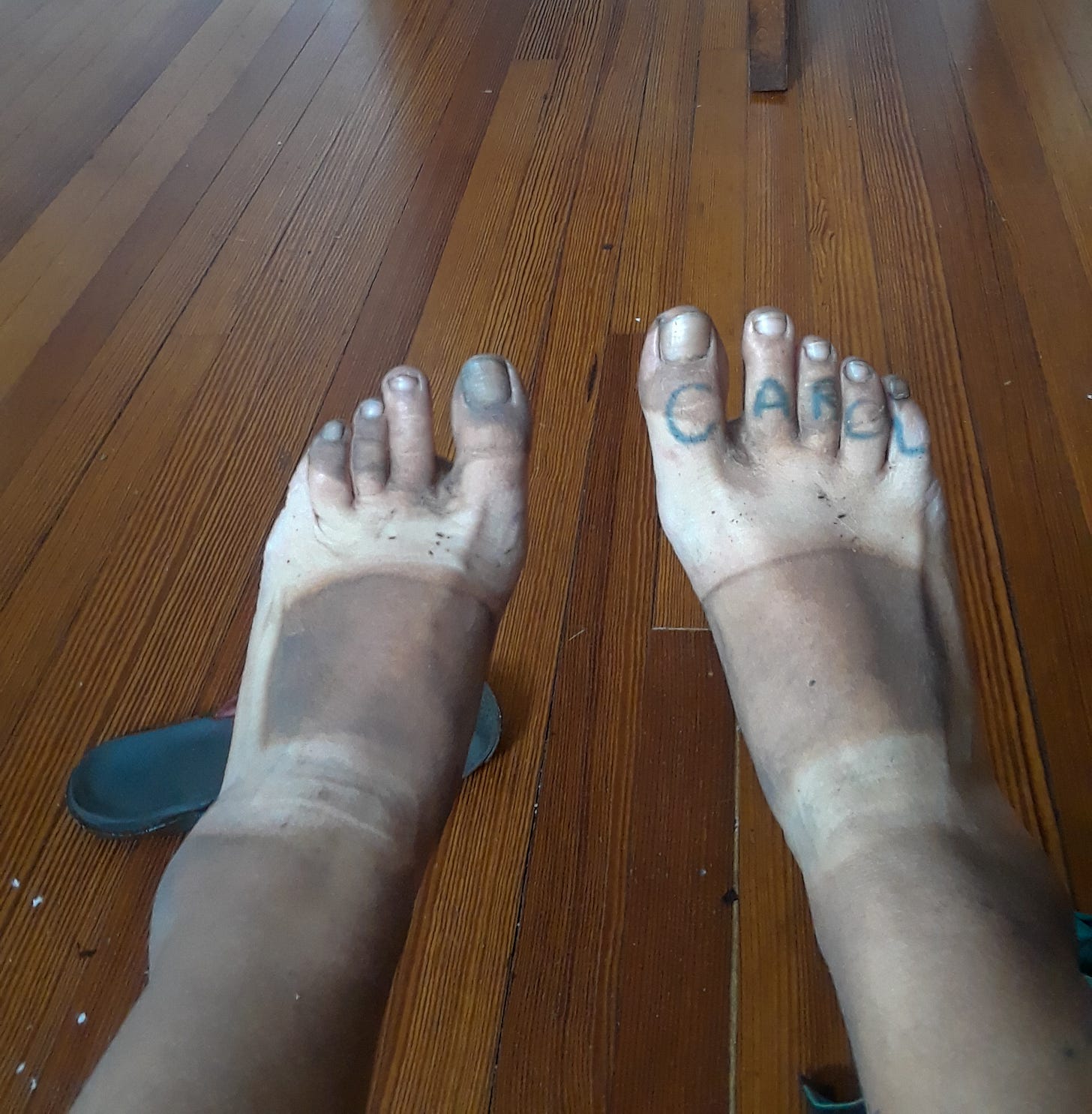“I’m starting a farm,” I say to anyone who asks what I’ll be doing when we move from Atlanta, Georgia to central Illinois over the summer of 2019. I like how impressed people tend to look, the “Wow!” that typically follows. It makes me feel like I have a plan, like I have things under control. Maybe if I can say it with enough confidence to convince someone else then I will have successfully convinced myself. But I do not have it - I do not have anything about my life whatsoever, it turns out - under control.
It started in 2017. I live in Atlanta. I have become obsessed with where my food comes from because I love to eat well and a lot (I imagine that this will be a recurring theme in this newsletter).
I am standing alone at the wash sink of the urban farm two blocks from the small house my partner and I rent, the urban farm where I volunteer once or twice a week and where we get almost all of our produce. The sink is a blue plastic rain barrel sliced down the middle, the halves side by side at waist height. It is a hot July day and I am steeped completely in the humid southern air. The rain barrel sinks are under a tarp that provides some shade that I savor. A slight cooling breeze wafts through and I can hear shouts of encouragement and competition from the track across the street. I am washing lettuce in the sink. It is perfectly green and crisp and exudes a specific, slightly bitter smell and milky juice that you can only notice in the few minutes after the leaves have been cut. My hands are in the ice-cold water swirling the leaves around the sink to rinse off any specks of dirt or hitch hiking bugs. I feel something rising up in me, a kind of golden bubble from my solar plexus as tears jump into the corners of my eyes, an unrecognizable feeling I have no name for. What is this feeling I’m having? What is happening to me? It gradually overtakes my body right down to my wet fingertips, touching the leaves the sun grew. I cast around into my memory for the words. All at once I realize – oh, there it is: that’s joy. Joy is the name for what I’m feeling.
That’s when I decided to change my life, and that growing food for people was part of it. At the time I worked as an administrator at a private university, which was fine enough work that became increasingly stressful over time as my burnout increased and my window of tolerance narrowed. I knew that the clock would run out when my partner finished grad school and that we would move somewhere else, and so I started devising and executing secret plans to become a farmer - naively, and obviously having pretty much no idea what that meant.
I set about learning as much as I could. I took classes on a variety of ways to garden in a variety of spaces, biodynamic farming, local wild plant ID. I read books like The One-Straw Revolution and Gaia’s Garden. Eventually I took a 6-month permaculture design certification course. Permaculture is an industry with some serious shortcomings (perhaps most notably a whiteness problem), but the course gave me a jumping-off place to start from and shifted my perspective in a way that has been helpful and worthwhile.
Fast forward to summer 2019, newly transplanted outside of Champaign-Urbana, Illinois. Absolutely in denial about the raw, untended emotional baggage I had arrived with. And now it’s time to start a fucking farm, from a wide expanse of lawn. I did a lot of sobbing on the floor, I remember. I was totally overwhelmed. I was a metal ladle incessantly scr a a a a ping the bottom of an empty tin bucket, coming up with nothing every time.
“I’m leaving the city to go live on a farm” is also often a shorthand for giving up on the problems of the world and its people and removing oneself to go, in an imagined rugged, individualistic way, wait it out till the apocalypse. It’s a throwing up of hands and turning away from the world - it was definitely that for me. And boy did I get more of that kind of isolation than I bargained for once the pandemic locked us down. But truly (and now it is obvious to me) I hadn’t escaped from anything. I was just more alone and more powerless. In Atlanta at least I’d been involved in organizations full of other people who were trying to do something worthwhile, like working on local food sovereignty initiatives and bailing people out of jail (this was part of the source of the burnout that I’d brought with me to Illinois). But moving to a new place outside of town with no social ties, no knowledge of the social fabric or the ecology, was all incredibly isolating. I thought that that was what I wanted - some space to breathe and think, to be out of the mix - and I was wrong. The real things I wanted (without in any way being able to articulate this at the time) were things like, the ability to put boundaries around my social and political lives so that I wasn’t constantly being consumed by them; I wanted (desperately!!!) to learn how to say no. I wanted to stop codependently wrapping my identity up with a group identity. I wanted to figure out how to come to terms with certain realities of the world - injustices that stuck in my throat like a bone - while continuing to work towards building something better. And I really, really wanted to quit drinking. But I didn’t know any of that yet, so I tried to quit the world and start a farm.
You don’t need a lot of land to start a farm, but you do need, like, a plan. Any plan. And an understanding of the local market. And literally any idea how a farm operates. I didn’t have any of those things, just a lot of hubris and desperation - two ingredients that make some grade-A delusions.
When I saw that an organic vegetable farm nearby was hiring, I jumped to apply. I figured it counted as progress - I’d be learning about organic farming in a hands-on way! I told myself. But really it was a relief to go to work and be told what to do for a while, and for the results of the work to be extremely tangible. It was a relief to have “is this potato good enough for market or not” be the biggest decision I made each day (even though I made that same decision hundreds of times as quickly as possible). It was a relief to feel my body hollowed out with exhaustion at the end of each work day.
And working on a farm made me feel stronger and more capable in ways that I had never experienced before (this might sound funny to my former coworkers who have seen me hilariously try to move a pump jack before I figured out the technique). A large part of this was physical: 10-hour days of any kind of manual labor will make you stronger, full stop. The work varied widely from day to day: perhaps moving dozens of crates of potatoes from one cooler to another, or loading the truck for market, or hauling buckets full of peppers or eggplants up and down the 200-foot rows of plants for hours, or a combination of those. But it was also knowing how to do very specific things, like how to drive the finicky electric farm trucks around in a way that avoided running over irrigation lines, or discerning the difference between two nearly identical varieties of tomatoes, or hacking off the unruly ends of a bunch of multicolored chard with a single slice of your knife. Sing-yelling Bohemian Rhapsody into your two-way radio to help your coworker locate the one they lost in field two.
It is easy to romanticize this work when you’re not doing it, and I am romanticizing it now. I also felt very silly and stupid a lot of the time, as will happen when you learn anything new. In so many ways it is a time in my life that I am unceasingly grateful for. Working on the farm gave me a lot of space to adapt to this new phase of my life. It gave me work that felt both novel and meaningful - it fed and nourished me literally and figuratively. It gave me time to think, and reconsider, and to change my mind. It gave me a place to go during the pandemic, which I think truly kept me from going over the edge, and an incredible group of coworkers who have become dear friends.
I acknowledge that these overwhelmingly positive feelings are possible because, while I worked hard and wanted the farm to do well, I had no responsibilities beyond basic harvesting and processing the produce. I didn’t know anything about the numbers, the margins. I didn’t lie awake at night worried about the weather. Owning and running an organic farm of any size is work that is unfathomably difficult and I have the highest regard and respect for anyone who does it. Farmers are heroes, y’all, honestly.
Working on this pre-existing farm helped me to see how totally unequipped I was to have one of my own - and the death of that delusion was actually incredibly freeing. That first year I planted dozens of trees, both fast-growing bushy native trees to act as screens in the buffer zone as well as American plums, pear, hazelnuts, gooseberries and paw paws on what had been the lawn. I laid down cardboard and mulch and made my lasagna method garden beds. I established patches for native pollinator plants. I stopped beating myself up for not knowing how to do things I’d never done before. I went to therapy and quit drinking. Everything shifted. I see so clearly now that what I want is not to escape from the world; what I want is meaningful work within a community. I want to work with people here to figure out how we make sure everybody eats well, and plenty. We’re each a lot more likely to make it through the apocalypse if we pull together. I know that that kind of community takes time and intention, and now I am willing and able to bring both of those things to the table.
One Action Item & One Unsolicited Recommendation
Remember two paragraphs ago when I said farmers are my heroes? The Central Illinois Young Farmers Coalition is fundraising for its CIDER fund, which stands for Central Illinois Disaster & Emergency Relief fund. This fund supplies small grants for farmers who experience catastrophes like flooding, fire, other acts of God. Supporting the fund is a great way to support the local farming community here in central Illinois. Or search for a chapter near where you live! Here’s the link for all the details here: https://www.youngfarmers.org/chapter/il-central-illinois-young-farmers-coalition/
A bunch of years ago my brother gave me an unusual and excellent cookbook that I’ve been revisiting: Scraps, Wilt & Weeds: Turning Wasted Food Into Plenty by Mads Refslund. Food waste makes me crazy and this cookbook is all about using the parts we typically throw by the wayside (and some of which it would never occur to me to try - brined cucumber peel? Buttered celery bottoms??). It is fun to play with and very satisfying to use all the food parts.
Thanks for being here! See ya next Wednesday.
Mere






